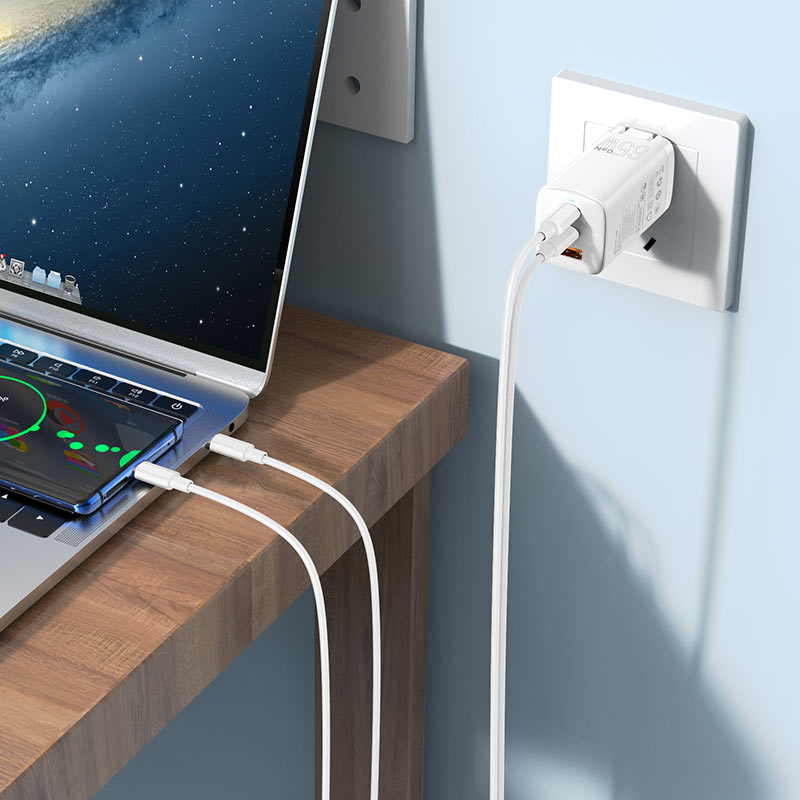UK GaN Charger Market: Sustainability and Energy Efficiency as Key Drivers of Growth
The UK GaN charger market is undergoing rapid transformation as the demand for energy-efficient and sustainable technology continues to grow. Among the notable innovations in this space is the emergence of Gallium Nitride (GaN) chargers, which have revolutionized the charging experience across various sectors. As global sustainability and energy efficiency concerns gain momentum, the demand for GaN chargers is poised to rise exponentially. This article explores the key drivers of the UK's GaN charger market, focusing on how sustainability and energy efficiency are propelling this shift towards new technologies.
The Rise of GaN Chargers in the UK
Gallium Nitride (GaN) is a wide-bandgap semiconductor material that has gained traction in recent years, particularly in the field of power electronics. Compared to traditional silicon-based chargers, GaN chargers offer several benefits, including smaller size, higher efficiency, and faster charging speeds. The UK, being a leader in tech innovation and sustainability initiatives, is experiencing significant growth in the adoption of GaN chargers for both consumer electronics and industrial applications.
This shift is largely driven by the growing awareness of environmental concerns and the increasing demand for energy-efficient solutions. As governments and consumers demand more sustainable products, GaN chargers are emerging as a key solution due to their ability to reduce energy consumption and minimize the carbon footprint of charging devices.
Sustainability as a Driving Force
Sustainability has become a significant focus across various industries, with consumers, businesses, and governments increasingly looking for ways to reduce their environmental impact. In the UK, sustainability is a critical element of the nation's energy strategy, with ambitious goals for carbon neutrality by 2050. The push for energy-efficient solutions in the technology sector is vital in achieving these targets.
GaN chargers are more sustainable compared to traditional silicon-based chargers because they operate more efficiently, resulting in less wasted energy during the charging process. Silicon-based chargers typically waste a significant amount of energy in the form of heat, while GaN's higher efficiency reduces this loss, leading to reduced energy consumption. Moreover, GaN chargers are smaller and lighter, which leads to reduced material use and less waste during manufacturing. This reduction in resource consumption aligns perfectly with the UK's sustainability goals, making GaN chargers an attractive option for both consumers and businesses seeking to minimize their environmental footprint.

Energy Efficiency Concerns Driving GaN Adoption
Energy efficiency is a critical issue not only for environmental sustainability but also for cost savings. As electricity prices rise and environmental regulations become stricter, both businesses and consumers are increasingly seeking solutions that can reduce energy consumption and lower costs. GaN chargers offer a significant advantage in this area.

Unlike traditional silicon-based chargers, which require larger components to handle high power levels, GaN chargers can achieve the same level of power in a smaller form factor. This results in less wasted power, higher conversion efficiency, and lower energy consumption. GaN's efficiency also translates into faster charging times for devices, as more energy is delivered directly to the battery rather than being lost as heat. This feature is especially appealing to consumers who value convenience and speed in their charging experiences.
GaN Chargers in the Consumer Electronics Market

The consumer electronics market is one of the largest sectors driving the growth of GaN chargers in the UK. With the rapid rise of mobile devices, laptops, and other portable electronics, the need for efficient and compact charging solutions has never been higher. Traditional chargers, with their bulky designs and slower charging speeds, are increasingly being replaced by more efficient GaN chargers.
GaN chargers are able to deliver faster charging times without generating excessive heat, making them more reliable and safer than conventional chargers. This is particularly important for high-performance devices such as gaming laptops, which require a higher power output for quick charging. Additionally, the compact nature of GaN chargers makes them ideal for users who value portability and ease of use, as they can be carried around easily without taking up much space in a bag or pocket.

As consumer demand for fast and efficient charging solutions grows, manufacturers are increasingly turning to GaN technology to meet these needs. Many well-known electronics brands in the UK have already started to incorporate GaN chargers into their product lines, offering consumers the latest in charging technology. This trend is expected to continue as more consumers become aware of the benefits of GaN chargers in terms of speed, energy efficiency, and sustainability.
Impact of UK Government Policies and Regulations

Government policies and regulations also play a significant role in accelerating the adoption of GaN chargers in the UK. The UK government has introduced a variety of initiatives aimed at promoting energy efficiency and reducing carbon emissions across industries. For instance, the government's Energy Efficiency Scheme provides financial incentives for businesses and consumers to adopt energy-efficient technologies, including those in the electronics sector.
In addition to these incentives, there are stringent regulations governing the energy efficiency of electronic devices and their chargers. As the UK continues to implement more robust energy efficiency standards, companies that fail to meet these criteria may face penalties. This regulatory pressure is encouraging manufacturers to adopt GaN technology, which offers a clear solution to meeting the government's efficiency targets.

Moreover, the UK's push toward a circular economy, which focuses on reducing waste and promoting the reuse and recycling of materials, is also beneficial for the GaN charger market. GaN chargers' smaller size and more efficient design mean that fewer resources are required to produce them, and their longer lifespan reduces the need for frequent replacements. This is in line with the UK's broader environmental goals and contributes to the increasing adoption of GaN technology.
Conclusion

The UK GaN charger market is experiencing significant growth driven by two key factors: sustainability and energy efficiency. As environmental concerns continue to influence consumer behavior and government policies, the demand for energy-efficient solutions like GaN chargers is expected to increase. These chargers not only offer a more sustainable alternative to traditional silicon-based chargers but also provide faster charging times and reduced energy consumption, making them a popular choice for both consumers and businesses.
With the UK's ambitious energy efficiency goals and focus on sustainability, GaN chargers are poised to play a crucial role in the country's transition to a greener, more energy-efficient future. As more consumers and industries recognize the advantages of GaN technology, its presence in the UK market is set to grow, driving innovation and progress in the technology sector. The future of the UK GaN charger market looks bright, with sustainability and energy efficiency at the forefront of this exciting new chapter in the world of power electronics.

The UK GaN (Gallium Nitride) charger market is poised to flourish, fueled by a relentless pursuit of sustainability and optimizing energy efficiency at the heart - driving growth through innovation-focused solutions.
The UK GaN Charger market is accelerating its growth trajectory due to the unwavering focus on sustainability and energy efficiency, setting a new benchmark for efficient power delivery in an eco-conscious future.
The UK's emerging GaN (Gallium Nitride) Charger market demonstrates a promising shift towards sustainability and energy efficiency, fueled by the growing emphasis on carbon footprint reduction. This technological advancement holds key to driving growth in an increasingly eco-conscious marketplace.
The UK GaN Charger market's steady growth is powered by an impressive convergence of the need for sustainability and optimization in energy efficiency, with both playing pivotal roles as key drivers hastening innovation within this evolving industry.
The UK GaN Charger market's strong emphasis on sustainability and energy efficiency presents significant growth opportunities through smart innovations that address the needs of a socially conscious consumer base.
The UK's GaN charger market is poised for significant growth, fueled primarily by consumers’ heightened awareness of sustainability and the demand for energy-efficient solutions that align with green living trends.
The UK's GaN charger market is poised for significant growth, driven primarily by an emphasis on sustainability and energy efficiency. Innovative Gallium Nitride technology has the potential to revolutionize consumer electronics charging in a greener way.
The UK GaN charger market is poised for an extraordinary growth leap, fueled by its emphasis on sustainability and energy efficiency as the cornerstone factors driving innovation.
The UK GaN Charger market's foremost drivers of growth are its emphasis on sustainability and energy efficiency, exemplified through the proliferation of advanced devices harnessing Gallium Nitride technology for improved charge times with less environmental impact.
The UK GaN charger market promises a promising future, fueled by an unwavering commitment to sustainability and optimal energy efficiency—two key drivers capable of propelling the sector towards groundbreaking innovation for cleaner power solutions.
The remarkable rise of the UK GaN charger market can be attributed to its focus on sustainability and optimal energy efficiency, which not only aligns with current environmental concerns but also caters strongly toward consumers' desire for productive yet resourceful charging solutions.
The UK GaN Charger market's growth will be primarily driven by the pursuit of sustainability and energy efficiency, as these factors align with consumers’ growing environmental concern for a more eco-friendly future.
The UK GaN Charger Market's steady growth will be fueled by a commitment to sustainability and energy efficiency, as these factors become increasingly crucial in the pursuit of environmentally conscious technology solutions.














